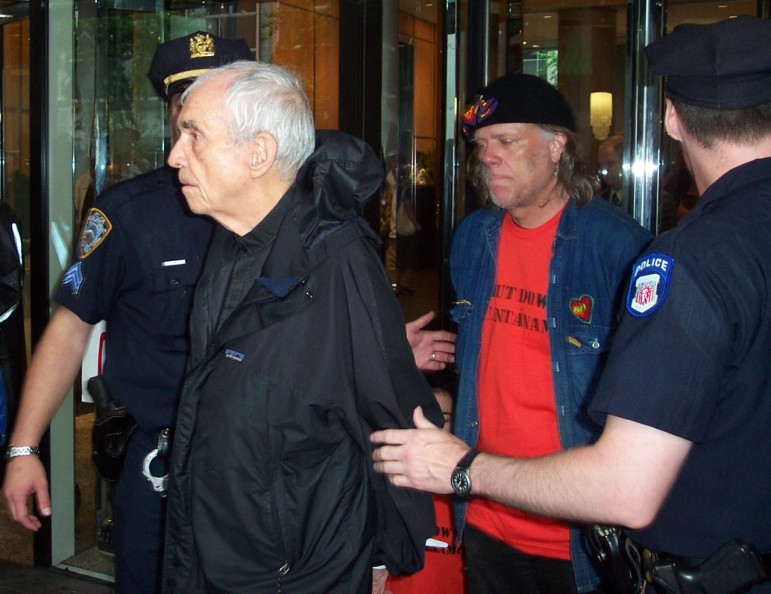NEW YORK (RNS) The Rev. Daniel Berrigan, a Jesuit priest and herald of the Catholic social justice movement whose name — along with that of his late brother, Philip, also a priest — became synonymous with anti-war activism in the Vietnam era, has died.
Berrigan, 94, had been living at the Jesuit infirmary at Fordham University in the Bronx when he died on Saturday (April 30).
“Berrigan undoubtedly stands among the most influential American Jesuits of the past century, joining the likes of John Courtney Murray and Avery Dulles,” the Rev. Luke Hansen wrote in the Jesuit magazine “America,” which first reported Berrigan’s death.
Yet while Murray was an intellectual renowned for pushing Catholicism to embrace religious liberty, and Dulles was famous for his theological insights, Berrigan became a prophetic activist who challenged his country to live up to a radical gospel vision of justice — a vision that challenged his own church at times.
“For me, Father Daniel Berrigan is Jesus as a poet,” the author Kurt Vonnegut, cited in the America obituary, once wrote. “If this be heresy, make the most of it.”
Berrigan certainly did make the most of it.
In May 1968, at the height of social tumult in the U.S. over civil rights and Vietnam, and shortly after the assassination of the Rev. Dr. Martin Luther King Jr., Berrigan gained worldwide attention when he, his younger brother Philip, who was a Josephite priest, and seven other Catholics seized draft records from a Selective Service office in Catonsville, Maryland.
The group doused the files with homemade napalm in a parking lot outside the draft office and torched them while joining hands in prayer. “It was Philip who came up with the idea,” Daniel Berrigan told America in 2009.
As The New York Times reported, the protesters issued a statement to the media that read, in part:
“We destroy these draft records not only because they exploit our young men but because they represent misplaced power concentrated in the ruling class of America.” It added, “We confront the Catholic Church, other Christian bodies and the synagogues of America with their silence and cowardice in the face of our country’s crimes.”
The Berrigan brothers were convicted in a federal trial and released on their own recognizance in 1970. They then went into hiding and refused to show up for jail.
Berrigan was eventually arrested by the FBI and sent to federal prison. He was released in 1972.
After the Vietnam War ended, the Berrigans continued their protests, breaking into a General Electric nuclear missile site in Pennsylvania in 1980 and damaging warhead nose cones and pouring blood onto documents and files.
Berrigan also protested subsequent U.S. military involvement overseas, and later ministered to AIDS patients and brought attention to their cause. He stood against abortion and capital punishment — an approach that would later come to be known as the “consistent ethic of life.”
As Berrigan said at a parish talk in Milwaukee in 1984, Christians should have no part in “abortion, war, paying taxes for war, (or) disposing of people on death row or warehousing the aged.”
Philip Berrigan died in 2002 but Daniel carried on their work. At 92, he took part in the Occupy Wall Street movement in New York’s Zuccotti Park.
Daniel Berrigan was born in 1921 into a German-Irish Catholic family in Minnesota, the fifth of six boy, and grew up on a farm near Syracuse, N.Y. He joined the Jesuit order in 1939 and was ordained a priest in 1952.
He was the author of more than 50 books and 15 volumes of poetry and became known as much for his writings and spirituality as his activism.
He was the inspiration for the “radical priest” in Paul Simon’s song “Me and Julio Down by the Schoolyard,” and had a small role as a priest in “The Mission,” a 1986 movie about Jesuit missionaries in South America.
He was also friends with Catholic icons like Thomas Merton and Dorothy Day, who he credited for inspiring much of his work.
In later life he wrote biblical commentaries, especially on the prophets, and he served as a mentor to younger Jesuits and activists, and led retreats.
Asked in the interview with America magazine for an inscription for his gravestone, Berrigan said: “It was never dull. Alleluia.”
The funeral for Berrigan is scheduled for Friday at the Church of St. Francis Xavier, a Jesuit parish in the Chelsea neighborhood of Manhattan.
(This story includes material from Reuters.)





